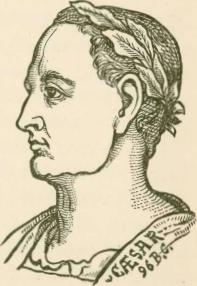OLD ROMAN LIFE. 37
that in creation the sun acted on the primitive miry earth, producing filmy bladders. These, becoming surrounded by a prickly rind, burst, and animals came forth. Man was first ejected as a fish. In this age Pythagoras taught that all things are constituted by the laws of Sacred Numbers, 54o B. C.
The phase of Grecian youth extended from Socrates to Epicurus, 341 B. C. Socrates taught that mathematics and physics lead to vain conclusions. His pupil, Plato, thinks that the senses are illusory, and he believes that God, Matter and Ideas are the three primary principles. Epicurus believed in pleasures through temperance, and rejects the doctrine of immortality. But it was in the domain of art that this age of Greece was to make its great and brilliant achievements. For several centuries the Greeks had carefully studied the external anatomy of man. They now showed the results in the first statuary and busts that had been correct in form and proportion. They imitated nature in her most graceful moods. In one age they passed from the rude copies of Egyptian or Etruscan art to the masterpieces of Phidias, Praxiteles, Polygnotus and Apelles. They carried art to that high state where it became the admiration of all succeeding ages. In architecture they give us beauty and grace and strength in the Corinthian, Ionic and Doric columns and capitals.
Maturity in Greece was ushered in by Aristotle, 384 B. C. He formulated the Inductive Method in Logic, and he taught that organic beings form a connected chain. But in physiology he thought that the brain is devoid of blood and of sensation. In this age Euclid develops geometry, 30o B. C., and Archimedes
(287 B. C.) writes on the sphere, cylinder, endless
screw, and many other physical problems. Eratos
thenes (276 B. C.) unfolds the first principles of
geology, and Hipparchus discovers the precession of
the equinoxes and makes a catalogue of i,o8o stars
(16o to 145 B. C.). The Greeks had now risen far above the vague fancies of their early philosophers. They had begun to lay the foundations of exact science. But they were not to rear the superstructure.
We have touched the fairest side of Greek national life. On the other hand, they had been warlike and ambitious from the beginning of their history. The great poems of Homer had immortalized the deeds of their fighting heroes. And now, in this age of maturity, the conquests by their mighty Alexander tempted them to broader and foreign arenas of martial glory. They soon fell beneath the heavier and more sturdy blows of Roman warriors. It was Roman ambition that prematurely stopped the
development of Greek intellect.
ROMAN LIFE AND FORMS.
The eastern wave of civilization had reached the countries of Greece seven centuries be
it
fore
And so
and in
Romans had become diligent
borrowers from the Greeks. The Roman who was ambitious to be learned must have a Greek for a tutor. The two
spread over Italy. in arts, in letters, schoolmasters the
